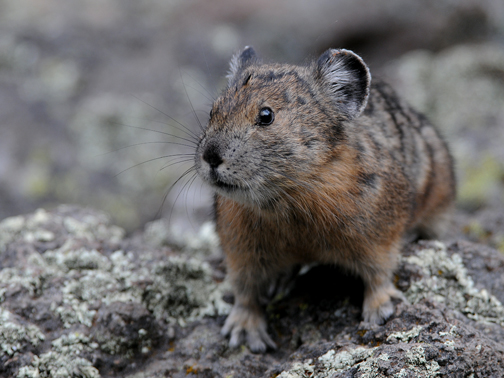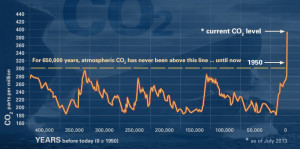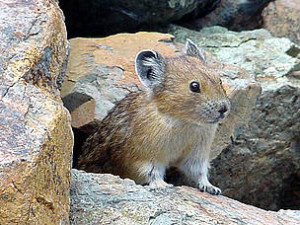All eyes on Paris

This plots atmospheric CO2 concentration synthesizing ice core proxy data 650,000 years in the past capped by modern direct measurements. Source: Global Climate Change — Earth Science Communications Team at NASA’s Jet Propulsion Laboratory/California Institute of Technology (data from NOAA)
American pikas live in high mountain ecosystems that are cool and moist. Warmer temperatures can cause the pikas to overheat. Unlike other mountain species that can move to higher altitudes in warming climates, pikas live so high on the mountain that there is nowhere for them to go. They could be the first mammal victim of climate change. WWF Global photo
12 days to save the world
From the Buenos Aires Herald:
After decades of struggling negotiations, marked by the failure of a previous summit in Copenhagen six years ago, some form of landmark agreement appears all but assured by mid-December. Warnings from climate scientists, demands from activists and exhortations from religious leaders like Pope Francis, coupled with major advances in cleaner energy sources, have all added to pressure to cut the carbon emissions warming the planet.
From the Toronto Star:
Climate scientists warn if emissions continue unabated the earth will warm more than 2 degrees Celsius and we’ll pass the threshold beyond which global warming becomes irreversible. Scientists say the impact of natural disasters could wipe out low-lying islands and trigger famines as a result of droughts and floods.
From the Globe and Mail:
Disagreements over the stringency of a potential deal could strain the talks, if not scuttle them. But whoever gets their way – the U.S., with its non-binding approach, or the more demanding Europeans – any agreement will face a long road to implementation. Any legal pact would risk crashing on the shoals of the U.S. Congress, both houses of which are controlled by conservative Republicans cold to action on climate change. And a Republican might win the presidency in 2016 and pull his or her country out of the deal anyway. Without the U.S., the world’s second-biggest carbon emitter, smaller countries would be likely to curb their own commitments.
From the Guardian:
The world is again at a crossroads. In Paris, our leaders will be asked to agree to another deal that could limit carbon emissions from factories and vehicles that burn fossil fuels. Each nation will be asked to put forward proposals to cut their output of carbon dioxide so that it will be possible to have an even chance of limiting global warming to a 2C increase over temperatures that were experienced in pre-industrial times. If they succeed, then the hopes for the next generation – those whose lives are described in these reports, gathered by the Catholic charity Cafod – will receive a welcome boost. If our leaders fail again, however, then the bleak lives outlined on these pages are destined to become even grimmer. Read more











Leave a Reply